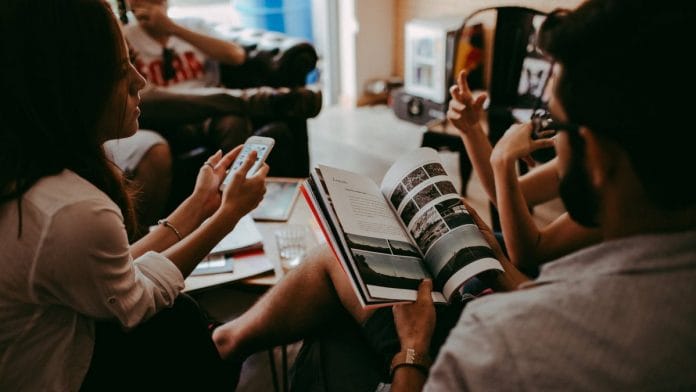I am a young, upper-caste millennial with a fairly privileged upbringing. The difficulties of adulting are a product of these variables. But the isolation is real. And both are inextricably linked in the new information age.
What would seem as simple — talking to a stranger — has become algorithmic and almost predictable. We no longer come across handsome or beautiful strangers in exotic bookshops, with whom we can strike up conversations. More often than not, the only strangers we meet are the ones whose pictures we swipe right on Tinder or Hinge or the ones who incidentally sign up for the same Cult classes.
In these desperate and dire times, Twitter and Instagram have become my real friends, always so giving and generous. The other app that I constantly find myself poring over is Google Calendar, which has become the only way to schedule time with my friends and family.
Despite being surrounded by the many WhatsApp groups and Instagram stories, I find myself talking to fewer and fewer people every day — just purposeless conversations. The other day, I managed to go from my office near ITO metro station to Gurugram without holding a single conversation, without meeting a single stranger or even experiencing a gesture of acknowledgement save for the single head nod from my Uber auto driver.
Researchers of the University of British Columbia had in 2013 tested whether social interaction with strangers could uplift a person’s mood. Unsurprisingly, they found that even the most trivial of encounters — a conversation with someone at a coffee shop or at the dog park — could make us happier through the day.
Also read: Indians talking mental health aren’t ‘millennial snowflakes’. Time for bosses to catch up
When time was not luxury
College was a time of fun and galore, of fluid boundaries between people, of barging into rooms without the slightest bit of concern. Good food, drinks, and even smokes were always passed around because they were a scarce resource (of course!). Notes were shared, and so were boyfriends and girlfriends.
I remember whiling away time, engaging in freewheeling conversations about anything and everything — from the horrid gatta curry being served at the canteen to Ambedkar and Periyar’s speeches.
Flashforward to 2018, like most adults with a useful degree, I landed a job with the burgeoning hope of becoming a reporter. Days became regimented, spent mostly between office and home. There’s not much I can remember of my two years as a “career woman” apart from a desk, newspaper, and a computer.
It’s not been as dreary as I’ve made it out to be. But, what irks me every day and has definitely become difficult to get used to are limited and mostly purpose-driven human interactions.
This might not seem strange at all as it’s become commonplace in this increasingly insular world. But, when I look back at how things were before, the only thing that seems to stand out is the isolation that adulthood has thrust me into.
Also read: Personal, not religious: Why people need to stop asking me about my knee-length hair
It’s a human thing
Every interaction has become commodified through the many apps and software that now control our lives. We no longer even have to ask for directions, all thanks to Google Maps.
I am not a purist or a romantic by a long shot, and I honestly don’t remember a time without a smartphone. But I surely am bothered by the human experience, and how isolating it can be.
In 1877, Robert Lous Stevenson had described the condition of “busyness” as a “symptom of deficient vitality” which produces “a sort of dead-alive hackneyed people about, who are scarcely conscious of living except in the exercise of some conventional occupation”.
“Dead-alive hackneyed people”: the description bears an eerie semblance to how I’ve felt in the years since college when I began adulting. I hope it will only get worse before it gets better.
Ironically, like most people, for the most part of my life I have wanted to…adult. A life without a curfew time, with abundant money and little parent supervision (or at least what I perceived adulting would be), has always been alluring.
But I never did fathom the limitations that would come along with these supposed freedoms. The implied social etiquette of the workplace, which demands that conversations only scratch the surface. “How do you do? Very well. What did you get for lunch today? Dal-chawal. Oh btw, the Delhi riots…” hum-drum and inconsequential conversation.
People with whom I interact with every day, if asked to describe me will perhaps only say that I’m among those Indians who when asked where they’re from will juxtapose ethnicity with their place of belonging (“a Bengali from Bangalore”). “And she’s into coronavirus”.
Well, it seems that adults really avoid digging too deep, avoid giving away too much. If only there was a way of telling my younger self the realities of this wondrous thing called adulting.
But if all of us are caught in our silos with our gadgets, then we need to perhaps redefine adulting — as an ability to be complete in oneself, without the need for a physical support system all the time. However, there will always be room for sunnier, frivolous days when conversations were endless and boundaries fluid.







She ‘poured’ over Google Calendar. Poured what? I could have sworn ‘pour’ was a transitive verb. But then, when Twitter and Instagram become your “real friends”, you tend not to know the difference between ‘pore’ and ‘pour’.
V.ery poor English. redeeming what? Lost in Babu english headline